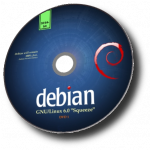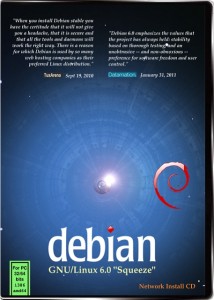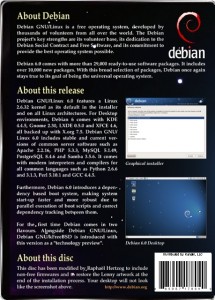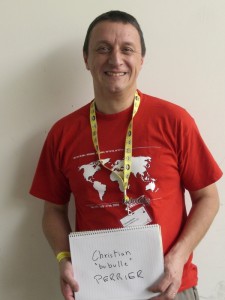
Christian is a figure of Debian, not only because of the tremendous coordination work that he does within the translation project, but also because he’s very involved at the social level. He’s probably in the top 5 of the persons who attended most often the Debian conference.
Christian is a friend (thanks for hosting me so many times when I come to Paris for Debian related events) and I’m glad that he accepted to be interviewed. He likes to speak and that shows in the length of his answers… 🙂 but you’ll be traveling the world while reading him.
My questions are in bold, the rest is by Christian.
Who are you?
I am a French citizen (which is easy to guess unless you correct my usual mistakes in what follows). I’m immensely proud of being married for nearly 26 years with Elizabeth (who deserves a statue from Debian for being so patient with my passion and my dedication to the project).
I’m also the proud father of 3 wonderful “kids”, aged 19 to 23.
I work as team manager in the Networks and Computers Division of Onera “the French Aerospace lab”, a public research institute about Aeronautics, Space and Defense. My team provides computer management services for research divisions of Onera, with a specific focus put on individual computing.
I entered the world of free software as one of the very first users of Linux in France. Back in the early 1990’s, I happened (though the BBS users communities) to be a friend of several early adopters of Linux and/or BSD386/FreeBSD/NetBSD in France. More specifically, I discovered Linux thanks with my friend René Cougnenc (all my free software talks are dedicated to René, who passed away in 1996).
You’re not a programmer, not even a packager. How did you come to Debian?
I’m definitely not a programmer and I never studied computing (I graduated in Materials Science and worked in that area for a few years after my PhD).
However, my daily work always involved computing (I redesigned the creep testing laboratory and its acquisition system all by myself during my thesis research work). An my hobbies often involved “playing” with home computers, always trying to learn about something new.
So, first learning about a new operating system…then trying to figure out how to become involved in its development was quite a logical choice.
Debian is my distro of choice since it exists. I used Slackware on work machines for a while, but my home server, kheops, first ran Debian 1.1 when I stopped running a BBS on an MS-DOS machine to host a news server. That was back in October 1996.
I then happened to be a user, and more specifically a user of genealogy software, also participating very actively in Usenet…from this home computer and server, that was running this Debian thing.
So, progressively, I joined mailing lists and, being a passionate person, I tried to figure out how I could bring my own little contribution to all this.
This is why I became a packager (yes, I am one!) by taking over the “geneweb” package, which I was using to publish my genealogy research. I applied as DD in January 2001, then got my account in July 2001. My first upload to the Debian archive occurred on August 22nd 2001: that was of course geneweb, which I still maintain.
Quite quickly, I became involved in the work on French localization. I have always been a strong supporter of localized software (I even translated a few BBS software back in the early 90’s) as one of the way to bring the power and richness of free software to more users.
Localization work lead me to work on the early version of Debian Installer, during those 2003-2005 years where the development of D-I was an incredibly motivating and challenging task, lead by Joey Hess and his inspiring ideas.
From user to contributor to leader, I suddenly discovered, around 2004, that I became the “coordinator” of D-I i18n (internationalization) without even noticing… 🙂
You’re the main translation coordinator in Debian. What plans and goals have you set for Debian Wheezy?
As always: paint the world in red.
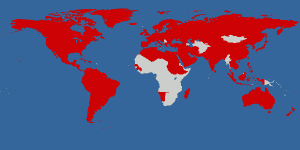
Indeed, this is my goal for years. I would like our favorite distro to be able to be used by anyone in the world, whether she speaks English, Northern Sami, Wolof, Uyghur or Secwepemctsín.
As a matter of symbol, I use the installer for this. My stance is that one should be able to even install Debian in one’s own language. So, for about 7 years, I use D-I as a way to “attract” new localization contributors.
This progress is represented on this page where the world is gradually painted in red as long as the installer supports more languages release after release. The map above tries to illustrate this by painting in red countries when the most spoken language in the country is supported in Debian Installer.
However, that map does not give enough reward to many great efforts made to support very different kind of languages. Not only various “national” languages, but also very different ones: all regional languages of Spain, many of the most spoken languages in India, minority languages such as Uyghur for which an effort is starting, Northern Sami because it is taught in a few schools in Norway, etc., etc.
Still, the map gives a good idea of what I would like to see better supported: languages from Africa, several languages in Central Asia. And, as a very very personal goal, I’m eagerly waiting for support of Tibetan in Debian Installer, the same way we support its “sister” language, Dzongkha from Bhutan.
For this to happen, we have to make contribution to localization as easy as possible. The very distributed nature of Debian development makes this a challenge, as material to translate (D-I components, debconf screens, native packages, packages descriptions, website, documentation) is very widely spread.
A goal, for years, is to set a centralized place where translators could work easily without even knowing about SVN/GIT/BZR or having to report bugs to send their work. The point, however, would be to have this without making compromises on translation quality. So, with peer review, use of thesaurus and translation memory and all such techniques.
Tools for this exist: we, for instance, worked with the developers of Pootle to help making it able to cope with the huge amount of material in Debian (think about packages descriptions translations). However, as of now, the glue between such tools and the raw material (that often lies in packages) didn’t come.
So, currently, translation work in Debian requires a great knowledge of how things are organized, where is the material, how it can be possible to make contribution reach packages, etc.
And, as I’m technically unable to fulfill the goal of building the infrastructure, I’m fulfilling that role of spreading out the knowledge. This is how I can define my “coordinator” role.
Ubuntu uses a web-based tool to make it easy to contribute translations directly in Launchpad. At some point you asked Canonical to make it free software. Launchpad has been freed in the mean time. Have you (re)considered using it?
Why not? After all, it more or less fills in the needs I just described. I still don’t really figure out how we could have all Debian material gathered in Rosetta/Launchpad….and also how Debian packagers could easily get localized material back from the framework without changing their development processes.
I have always tried to stay neutral wrt Ubuntu. As many people now in Debian, I feel like we have reached a good way to achieve our mutual development. When it comes at localization work, the early days where the “everything in Rosetta and translates who wants” stanza did a lot of harm to several upstream localization projects…is, I think, way over.
Many people who currently contribute to D-I localization were indeed sent to me by Ubuntu contributors….and by localizing D-I, apt, debconf, package descriptions, etc., they’re doing translation work for Ubuntu as well as for Debian.
Let’s say I’m a Debian user and I want to help translate Debian in my language. I can spend 1 hour per week on this activity. What should I do to start?
Several language teams use Debian mailing lists to coordinate their work. If you’re lucky enough to be a speaker of one of these languages, try joining debian-l10n-<yourlanguage> and follow what’s happening there. Don’t try to immediately jump in some translation work. First, participate to peer reviews: comment on others’ translations. Learn about the team’s processes, jargon and habits.
Then, progressively, start working on a few translations: you may want to start with translations of debconf templates: they are short, often easy to do. That’s perfect if you have few time.
If no language team exists for your language, try joining debian-i18n and ask about existing effort for your language. I may be able to point you to individuals working on Debian translations (very often along with other free software translation efforts). If I am not, then you have just been named “coordinator” for your language… 🙂 I may even ask you if you want to work on translating the Debian Installer.
What’s the biggest problem of Debian?
We have no problems, we only have solutions… 🙂
We are maybe facing a growth problem for a few years. Despite the increased “welcoming” aspects of our processes (Debian Maintainers), Debian is having hard times in growing. The overall number of active contributors is probably stagnating for quite a while. I’m still amazed, however, to see how we can cope with that and still be able to release over the years. So, after all, this is maybe not a problem… 🙂
Many people would point “communication problems” here. I don’t. I think that communication inside the Debian project is working fairly well now. Our “famous” flame wars do of course still happen from time to time, but what large free software project doesn’t have flame wars?
In many areas, we indeed improved communication very significantly. I want to take as an example the way the release of squeeze has been managed. I think that the release team did, even more this time, a very significant and visible effort to communicate with the entire project. And the release of squeeze has been a great success in that matter.
So, there’s nearly nothing that frustrates me in Debian. Even when a random developer breaks my beloved 100% completeness of French translations, I’m not frustrated for more than 2 minutes.
You’re known in the Debian community as the organizer of the “Cheese & Wine Party” during DebConf. Can you tell us what this is about?
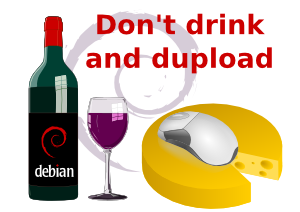
This is an interesting story about how things build themselves in Debian.
It all started in July 2005, before DebConf 5 in Helsinki. Denis Barbier, Nicolas François and myself agreed to bring at Debconf a few pieces of French cheese as well as 1 or 2 bottles of French wine… and share them with some friends. Thus, we settled an informal meeting in “the French room” where we invited some fellows: from memory, Benjamin “Mako” Hill, Hannah Wallach, Matt Zimmermann and Moray Allan. All of us fond of smelly cheese, great wine… plus some extra “pâté” home-made by Denis in Toulouse.
It finally happened that, by word of mouth, a few dozens of other people slowly joined in that French room and turned the whole thing into an improvized party that more or less lasted for the entire night.
The tradition was later firmly settled in 2006, first in Debconf 6 in Mexico where I challenged the French DDs to bring as many great cheese as possible, then during the Debian i18n meeting in Extremadura (Sept 2006) where we reached the highest amount of “cheese per participant” ever. I think that the Creofonte building in Casar de Cáceres hasn’t fully recovered from it and is still smelling cheese 5 years after.
This “party” later became a real tradition for DebConf, growing over and over each year. I see it as a wonderful way to illustrate the diversity we have in Debian, as well as the mutual enrichment we always felt during DebConfs.
My only “regret” about it is that it became so big over the years that organizing it is always a challenge and I more and more feel pressure to make it successful. However, over the years, I always found incredible help by DebConf participants (including my own son, last year… a moment of sharing which we will both remember for years, i think). And, really, in 2010, standing up on a chair, shouting (because the microphone wasn’t working) to thank everybody, was the most emotional moment I had at Debconf 10.
Is there someone in Debian that you admire for their contributions?
So many people. So, just like it happens in many awards ceremonies, I will be very verbose to thank people, sorry in advance for this.
The name that comes first is Joey Hess. Joey is someone who has a unique way to perceive what improvements are good for Debian… and a very precise and meticulous way to design these improvements. Think about debconf. It is designed for so long now and still reaching its very specific goal. So well designed that it is the entire basis for Joey’s other achievement: designing D-I. Moreover, I not only admire Joey for his technical work, but also for his interaction with others. He is not he loudest person around, he doesn’t have to….just giving his point in discussion and, guess what? Most of the time, he’s right.
Someone I would like to name here, also, is Colin Watson. Colin is also someone I worked with for years (the D-I effect, again…) and, here again, the very clever way he works on technical improvements as well as his very friendly way to interact with others…just make it.
And, how about you, Raphaël? 🙂 I’m really admirative of the way you work on promoting technical work on Debian. Your natural ability to explain things (as good in English as it is in French) and your motivation to share your knowledge are a great benefit for the project. Not to mention the technical achievements you made with Guillem on dpkg of course!
Another person I’d like to name here is Steve Langasek. We both maintain samba packages for years and collaboration with him has always been a pleasure. Just like Colin, Steve is IMHO a model to follow when it comes at people who work for Canonical while continuing their involvment in Debian. And, indeed, Steve is so patient with my mistakes and stupid questions in samba packaging that he deserves a statue.
We’re now reaching the end of the year where Stefano Zacchiroli was the Debian Project Leader. And, no offense intended to people who were DPL before him (all of them being people I consider to be friends of mine), I think he did the best term ever. Zack is wonderful in sharing his enthusiasm about Debian and has a unique way to do it. Up to the very end of his term, he has always been working on various aspects of the project and my only hope is that he’ll run again (however, I would very well understand that he wants to go back to his hacking activities!). Hat off, Zack!
I again have several other people to name in this “Bubulle hall of Fame”: Don Armstrong, for his constant work on improving Debian BTS, Margarita Manterola as one of the best successes of Debian Women (and the most geeky honeymoon ever), Denis Barbier and Nicolas François because i18n need really skilled people, Cyril Brulebois and Julien Cristau who kept X.org packaging alive in lenny and squeeze, Otavio Salvador who never gave up on D-I…even when we were so few to care about it.I would like to make a special mention for Frans Pop. His loss in 2010 has been a shock for many of us, and particularly me. Frans and I had a similar history in Debian, both mostly working on so-called “non technical” duties. Frans has been the best release manager for D-I (no offense intended, at all, to Joey or Otavio….I know that both of them share this feeling with me). His very high involvment in his work and the very meticulous way he was doing it lead to great achievements in the installer. The Installation Guide work was also a model and indeed a great example of “non technical work” that requires as many skills as more classical technical work. So, and even though he was sometimes so picky and, I have to admit, annoying, that explains why I’m still feeling sad and, in some way, guilty about Frans’ loss.
One of my goals for wheezy is indeed to complete some things Frans left unachieved. I just found one in bug #564441: I will make this work reach the archive, benefit our users and I know that Frans would have liked that.
Thank you to Christian for the time spent answering my questions. I hope you enjoyed reading his answers as I did. Subscribe to my newsletter to get my monthly summary of the Debian/Ubuntu news and to not miss further interviews. You can also follow along on Identi.ca, Twitter and Facebook.
